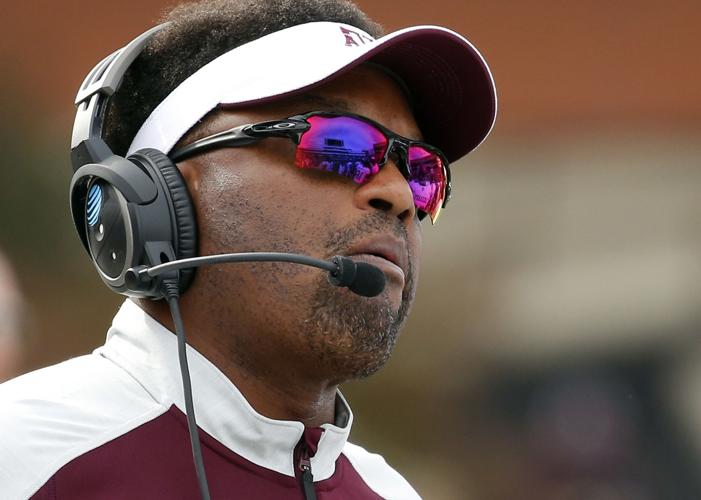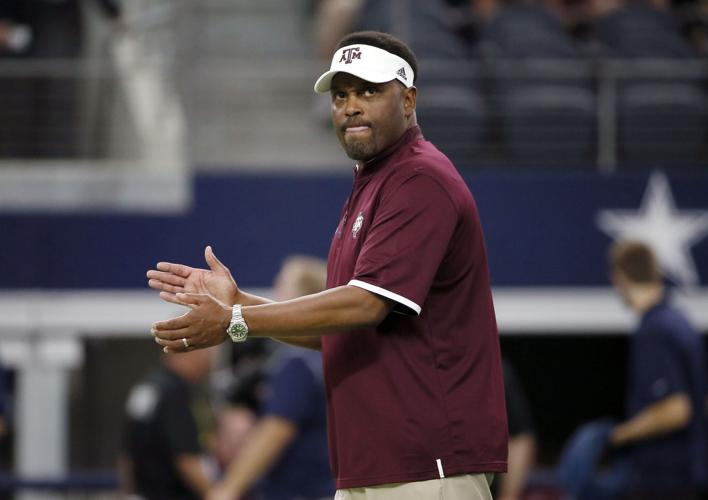Kevin Sumlin was born in Alabama, eight miles from the Florida panhandle in the “colored” wing of a segregated hospital. That was 1964.
Five years later, after new Arizona football coach Bob Weber had hired all but one assistant coach, UA athletic director Dick Clausen told the Star, “I’d like to fill the remaining post with a Negro coach.”
That didn’t happen. The UA didn’t hire its first African-American assistant football coach until Willie Peete in 1971.
On Monday, to celebrate Martin Luther King Jr. Day, Peete’s son, former Sahuaro High and USC quarterback Rodney Peete, quoted from a 1968 MLK civil rights speech in a message to his 23,000 twitter followers.
It was good timing. Arizona hired Sumlin to be its football coach on Sunday, meaning the Pac-12 now has three black head football coaches for the first time in history.
Slow to exhibit racial diversity in numbers commensurate with those who play Pac-12 football, the conference has employed 88 head football coaches since Arizona and ASU joined the league in 1978.
Sumlin is the eighth black man to be so hired.
Cal, Oregon State, Washington State, USC and Utah have never employed a black head football coach.
It was overdue for Arizona to seriously consider a black football coach; in its history, the UA had given an official interview to just one black head coaching candidate, and that was two-time Arizona All-American Ricky Hunley in 2004. The school hired Oklahoma defensive coordinator Mike Stoops.
The numbers do not line up.
On pages 103-111 of its 2017 football media guide, Arizona lists the starters at every position, in every game for the last 25 seasons, 1992-2016. In that period, there were 6,600 starting spots in UA football games.
After counting and recounting, I found that 3,187 of those game-to-game starting roles were filled by black football players. My addition may be off by a few numbers here or there, but that’s pretty close to 50 percent .
It’s not just that Arizona had never had a black football coach, it’s also that of the 171 assistant coaches in the school’s football history, only 28 are black. And only three of those, Dino Babers, Calvin Magee and Marcel Yates, had the title of coordinator.
It’s telling — mystifying — that the Pac-12 had just three black coordinators in 2017 –Yates, Magee and USC’s Tee Martin. That’s surely why there are so few black head coaches in Power 5 football; you rarely can become a head coach unless you are first a coordinator.
Sumlin beat the negative numbers by rising to the rank of coordinator at Texas A&M in 2002 and at Oklahoma in 2006 and 2007.
And it’s not like the numbers of minority players is diminishing. Of the 16 players Arizona signed to letters-of-intent in December, 11 are black and two are Polynesian. That is probably close to the racial breakdown of every Pac-12 recruiting class.
Sumlin comes from a family that took part in historic American civil-rights work, helping to change the nation’s culture, and especially that of the Deep South.
His grandmother, Ella Maude Nettles Sumlin, who died last year at 101, worked for the Escambia County School District in Brewton, Alabama.
She worked as a teacher’s aide and a substitute teacher, and was known for being part of the administration that helped with the integration of the Southern Normal High School, which until 1969 was the only school in Brewton that educated African-American students.
Kevin’s father, William Sumlin, died in 2016. It prompted Roderick E. Bohannon, former president of the Greater Indianapolis Branch of the NAACP, to write this tribute: “I knew Bill from his actions with the NAACP. He helped the NAACP in its transition and was a long-time civil rights activist. He was a good man.”
You can say Kevin Sumlin’s path to being a head coach in college football was assisted by his grandmother and his father.
You can also say that Arizona deserves credit as one of the pioneering major colleges to provide opportunities for black head coaches. In the summer of 1969, Arizona hired Compton Junior College coach Willie Williams to be its track coach.
Williams is believed to be the first black man to be a head coach at a major college.
“This is another step in weaving the black man into the mainstream of our society,” Williams told the Star in 1969. “There will be people on the other side who don’t think this is right.”
It worked out so well for Arizona that three years later it became the first Division I school to hire a black man, Fred Snowden, to be its basketball coach.
In the decades to follow, Arizona hired four black men and women to be head coaches — women’s basketball coaches Niya Butts and Adia Barnes, track coach Fred Harvey and gymnastics coach John Court.
Now comes Kevin Sumlin. It has been a long, hard road for every black coach in college sports. But even now, for the UA as well as America’s other athletic programs, the journey remains in its infancy.





